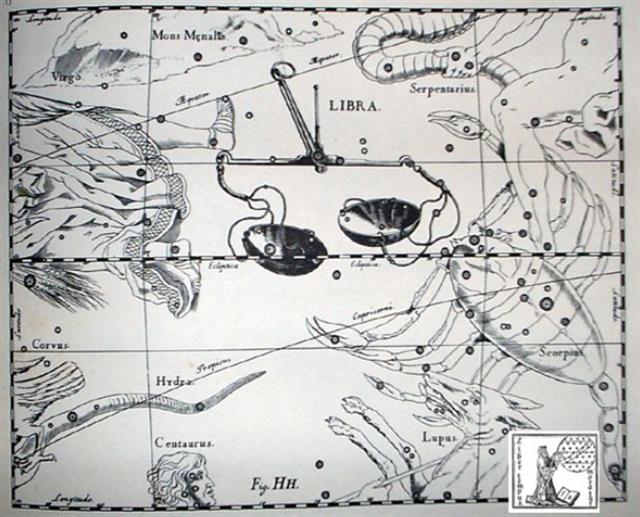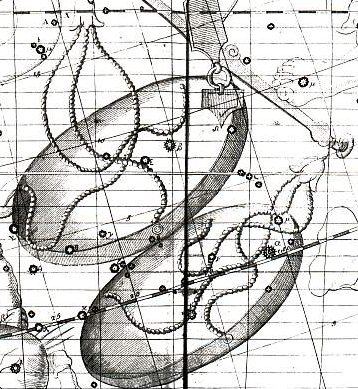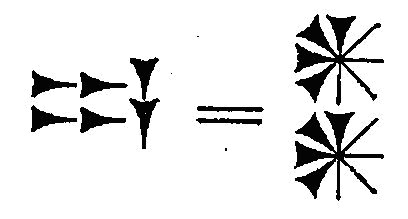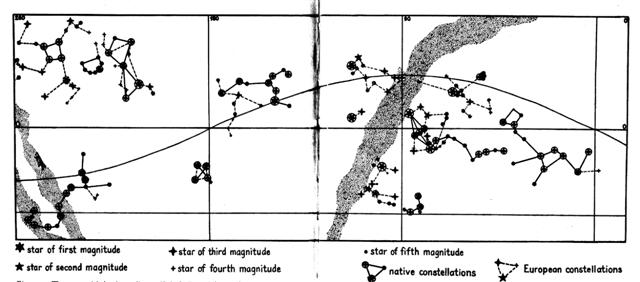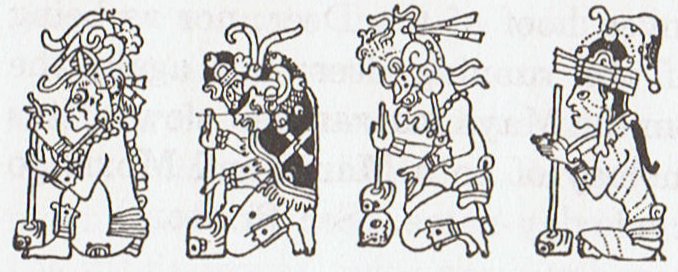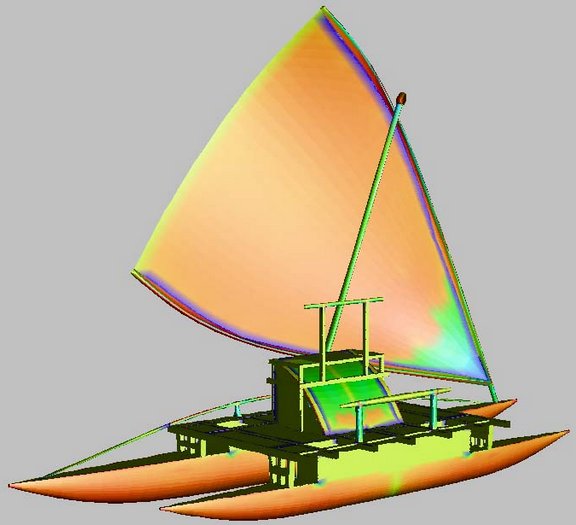The rope of Oroi was picked up by him when he saw that Hotua A Matua had reached Hatinga Te Kohe: ... The king went towards the sea [a tai] (i.e., toward the southern shore). When he reached Hatinga Te Kohe A Hau Matua, Oroi saw [he ūi mai a Oroi] that the king had reached Hatinga Te Kohe [ko te ariki.ka tuu atu ki hatinga i te kohe]. Oroi picked up the rope, took it [he mau], and came to the path (which the king had to pass), and took the end of the rope into his hand [he mau i te potu o te taura] ... [E:1002-1003] This place name was evidently connected with a threat to the king, signified by his 'staff' (Te Kohe) breaking apart (hatiga). Kohe. A plant (genus Filicinea) that grows on the coast. Vanaga. Vave kai kohe, inaccessible. Churchill. *Kofe is the name for bamboo on most Polynesian islands, but today on Easter Island kohe is the name of a fern that grows near the beach. Barthel 2. ... Several Asian cultures, including that of the Andaman Islands, believe that humanity emerged from a bamboo stem. In the Philippine creation myth, legend tells that the first man and the first woman were split open from a bamboo stem that emerged on an island created after the battle of the elemental forces (Sky and Ocean). In Malaysian legends a similar story includes a man who dreams of a beautiful woman while sleeping under a bamboo plant; he wakes up and breaks the bamboo stem, discovering the woman inside. The Japanese folktale 'Tale of the Bamboo Cutter' (Taketori Monogatari) tells of a princess from the Moon emerging from a shining bamboo section. Hawaiian bamboo ('ohe) is a kinolau or body form of the Polynesian creator god Kane. An ancient Vietnamese legend tells of a poor, young farmer who fell in love with his landlord's beautiful daughter. The farmer asked the landlord for his daughter's hand in marriage, but the proud landlord would not allow her to be bound in marriage to a poor farmer. The landlord decided to foil the marriage with an impossible deal; the farmer must bring him a 'bamboo tree of one-hundred sections'. The benevolent god Bụt appeared to the farmer and told him that such a tree could be made from one-hundred sections from several different trees. Bụt gave the him four magic words to attach the many sections of bamboo: 'Khắc nhập, khắc xuất', which means 'put in immediately, take out immediately'. The triumphant farmer returned to the landlord and demanded his daughter. The story ends with the happy marriage of the farmer and the landlord's daughter ... The dream soul (kuhane) of Hau Maka - sleeping soundly in Hiva - broke the 'bamboo' ... The Tahitian conception of the sky as resting on ten star pillars is unique and is doubtless connected with their cosmos of ten heavens. The Hawaiians placed a pillar (kukulu) at the four corners of the earth after Egyptian fashion; while the Maori and Moriori considered a single great central pillar as sufficient to hold up the heavens. It may be recalled that the Moriori Sky-propper built up a single pillar by placing ten posts one on top of the other ... The 10th kuhane station was Hatinga Te Kohe. with her feet: ... he oho hokoou te kuhane he ata pe hiva he hati te kohe i te vae [she was careless (?) and broke the kohe plant with her feet] he nape i te ingoa ko hatinga te kohe.a hau maka. o hiva ... [E:8] Ata 1. Dawn, first light before sunrise; ku-hamu-á te ata, dawn has broken; ku-tehe-á te ata, it's already dawn (lit.: the lights have flown). 2. Particle inserted between the imperative prefix ka and the verb to signify 'well, carefully, intelligently': ka-ata-hakarivariva, prepare it well. Between the prefix e and kahara it expresses 'to make sure that, to take good care that...' : e-ata-kahara koe o oona, be careful not to get dirty; e-ata-kahara koe o kori te moa o te tahi pa, be sure not to steal chickens of another property. 3. More: iti, small; ata iti, smaller; he-ata-ata iti-iti ró, the smallest of all. Vanaga. Âta 1. Shadow: he-veveri te poki, ana tikea toona âta, the child is frightened at seeing his shadow; person's reflection (in mirror, in water): he âta oou-á, it's your own reflection. 2. To be frightened by a shadow: he-âta te îka, the fish are frightened (and they flee) by people's shadows. Vanaga. 1. Image, picture, portrait, design; to draw, to paint (shadow sense). P Mgv: ata, image, likeness, portrait, shadow of a human being, form, shape, appearance, imprint, impression. Mq.: ata, image, statue, portrait, shadow, surface; to design, to mark. Ta.: ata, shade, shadow appearance, form, representation of an object, cloud, cloudy. 2. Transparency, end of day, sunset (bright sense); e ata, red clouds; ku ata, transparent; ata mea, ata tea, ata tehe, dawn, daybreak, sunrise; ataata, end of day, sunset. P Mgv.: ata, morning or evening twilight, daybreak, dawn; ata haihai, evening twilight, a beautiful sunset; ataiai, twilight, clouds red with the sunset; atakurakura, a beautiful sunrise or sunset; atareureu, dawn, the first peep of day, morning twilight. Mq.: ata, to appear, to rise, to shine (of stars); ata uá, morning twilight; ataata, diaphanous, transparent. Ta.: ata, twilight. 3. A designation of space; ata hakahohonu, abyss; ata hakaneke mai, nearby, close at hand; ata tapa, lateral, marginal. 4 ? Ata kimikimi, to inquire; ata puo, to hill a plant; ata ui, to examine, to taste. Churchill. Atahenua (ata 3 - henua 1), landscape, countryside. Atakai: 1. Generous, hospitable, beneficent, indulgent, liberal, obliging; prodigality, indulgence; rima atakai, benevolent, generous, open-handed; gift, liberality. 2. Calm, unperturbed, grateful. Churchill. Ata-ta T, evening (? ataata). Atatehe (ata 2 - tehe 1), dawn; popohaga atatehe, morning, early in the morning. Churchill. Mg.: ata, a shelf; atamoa, a ladder; atarau, an altar. Mgv.: avata, a coffer, a box. Pe. 1. Like, as. PS Mgv.: pe, as, the same as, also. Sa.: pei, like, as. Niuē: pehe, thus. 2. And, also (in numerals); e rua te hagahuru pe aha, twenty-four. PS Sa.: pe, a restrictive particle in counting, only. To.: be, only. Uvea: pe, id. Churchill. Pau.: Spoilt, damaged. Mgv.: pee, macerated, spoilt. Ta.: pe, spoilt, rotten. Mq.: pe, id. Sa.: pe, id. Ma.: pe, pulpy, purulent. Churchill. PE, adj. Marqu., bad, impudent, naked. Ta., pe, rotten, decayed. Sam., pe, be dead, as trees, extinguished, as fire, dried up, as water. Haw., pe, to crush, pound fine; pepe, broken, bruised, pliable, rotten, soft; u-pepe, weak, feeble, dry. Fiji., be, impudent, irreverent. Benfey (Sanskr. Dict.) refers the Latin pejor, pessimus, pecco, to a Sanskrit word, pâpa, evil, wicked, sinful. The Polynesian pe apparently offers a better and more direct root for pejor, pecco, &c. Benfey gives no root or etymon of pâpa, nor, if derived from pâ, to protect, to guard, how the transition is made to wickedness, crime, sin. Here as in so many instances, the Polynesian supplies the missing-link in the Hawaiian verb papa, 'to prohibit, forbid, rebuke, reprove', a derivative or duplicate of pa, 'to fence, enclose, restrict'. And thus the transition from the Polynesian papa, prohibited, forbidden, to the Sanskrit pâpa, sinful, wicked, becomes easy and intelligible. Fornander. I have suggested the feet of the dream soul here primarily referred to the right foot of Virgo - on the opposite side of Libra compared to the Serpent carrier:
Later, when the Explorers reached Hatinga Te Kohe (on the south coast of Easter Island) this happened in "July: ... They took their provisions with them, carrying them on their shoulders, went on, and reached Te Pou. They made camp and slept in Te Pou on the tenth day of the month of July ('Anakena'). [E:22] Then they all got up, carried their provisions on their shoulders, went straight ahead, and followed the path of the dream soul of Hau Maka. They came to Hua Reva and said, This is Hua Reva A Hau Maka! They went on and reached Akahanga, took a look at it and looked around. They said: This is it! and gave the name Akahanga A Hau Maka. They went on and came to Hatinga Te Kohe and saw that in this place the kohe plant had been broken. They all said, Here it is, the kohe plant, troop of young men! This kohe plant had been broken by the feet of the dream soul and therefore they gave the name Hatinga Te Kohe A Hau Maka. They went on and came to Roto Iri Are. Again they said, There it is, Roto Iri Are and named (the place) Roto Iri Are A Hau Maka. They went on and reached Tama. They looked around and said, This is Tama. They gave the name Tama, an evil fish (he ika kino), a very long nose (He ihu roroa). Again they went on and came to One Tea. They saw it, looked around, and gave the name One Tea A Hau Maka. Then they went on and came to Hanga Takaure. There they gave the name Hanga Takaure A Hau Maka. They made camp and rested at the Bay of Flies for a week (etahi pohitu). On the eighteenth day of the month of July (Anakena) they went on from Hanga Takaure. They climbed uphill, went on, and reached Poike. When they arrived, they looked around and named (the place) 'Poike A Hau Maka' ... ... "July 18 was day 199 and "July 10 (191) was 8 days earlier. If the Explorers had stayed for a week at Hanga Takaure they ought to have arrived there in "July 11 (192 = 199 - 7) ... When in May 1 (121) the Sun rose together with Bharani the Full Moon was at Zuben Elgenubi in day 121 + 183 = 304 (October 31):
This could evidently once upon a time have been regarded as the point of balance between summer and winter (day and night). Since then the equinox would have moved 41 days earlier in the year to day 121 - 41 = 80 (March 21). If Oroi had hidden himself at Markab and Scheat Pegasi, then this place ought to have been close to the Full Moon in day 64 (March 5) + 183 = 247 (September 4). ... He went into a (grove of) sandalwood. He had hidden there so he could watch the arrival of the king and (at the moment when) the foot (of the king touched the loop) quickly pull the rope. Then Oroi would come out immediately and kill the king. The terns calmly circled [ka hiri nō.te manu tara] above the king when he arrived [e oho.era]. King Hotu came along and reached Te Tingaanga O Te Hereke (literally, 'the meeting place of the dangerous one' ?) ... [E:1005]
At the time of Bharani the corresponding place would have been in "July 25 (206). However, according to Manuscript E the Explorers were at Hatinga Te Kohe in "July 11 (192). We can add 16 (nights when the stars were invisible due to the close distance to the Sun) and reach 208. 208 = 16 * 13 and 208 + 80 = 288. ... The double canoe reached Easter Island in "October 15 (288) - a date we can recognize e.g. from the 'birth' of our own calendar: ... The Julian calendar day Thursday, 4 October 1582 was followed by the first day of the Gregorian calendar, Friday, 15 October 1582 (the cycle of weekdays was not affected) ... ... The position of Nunki (the Star of the Proclamation of the Sea) was in right ascension day *288 (as counted from 0h at the time of rongorongo) ... 432 (March 8) - 64 (March 5) = 368 days. There were 3 days with only cold food (without fire for cooking) and Väinömöinen could not find 3 glyphs until the Giant told him where they were. ... In China, every year about the beginning of April, certain officials called Sz'hüen used of old to go about the country armed with wooden clappers. Their business was to summon the people and command them to put out every fire. This was the beginning of the season called Han-shih-tsieh, or 'eating of cold food'. For three days all household fires remained extinct as a preparation for the solemn renewal of the fire, which took place on the fifth or sixth day after the winter solstice [Sic!] ...
... Väinämöinen set about building a boat, but when it came to the prow and the stern, he found he needed three words in his rune that he did not know, however he sought for them. In vain he looked on the heads of the swallows, on the necks of the swans, on the backs of the geese, under the tongues of the reindeer. He found a number of words, but not those he needed. Then he thought of seeking them in the realm of Death, Tuonela, but in vain. He escaped back to the world of the living only thanks to his potent magic. He was still missing his three runes. He was then told by a shepherd to search in the mouth of Antero Vipunen, the giant ogre. The road, he was told, went over swords and sharpened axes. Ilmarinen made shoes, shirt and gloves of iron for him, but warned him that he would find the great Vipunen dead. Nevertheless, the hero went. The giant lay underground, and trees grew over his head. Väinämöinen found his way to the giant's mouth, and planted his iron staff in it. The giant awoke and suddenly opened his huge mouth. Väinämöinen slipped into it and was swallowed. As soon as he reached the enormous stomach, he thought of getting out. He built himself a raft [cfr The Heavenly Raft, θ Aquilae, *305], and floated on it up and down inside the giant. The giant felt tickled and told him in many and no uncertain words where he might go, but he did not yield any runes. Then Väinämöinen built a smithy and began to hammer his iron on an anvil, torturing the entrails of Vipunen, who howled out magic songs to curse him away. But Väinämöinen said, thank you, he was very comfortable and would not go unless he got the secret words. Then Vipunen at last unlocked the treasure of his powerful runes. Many days and nights he sang, and the sun and the moon and the waves of the sea and the waterfalls stood still to hear him. Väinämöinen treasured them all and finally agreed to come out. Vipunen opened his great jaws, and the hero issued forth to go and build his boat [cfr Zaurak, the Boat, γ Eridani, *305 + *118 = *58 + *365] at last ...
|
|||||||||||||||||||||||||||||||||||||||||||||||||||||||||||||||||||||||||||||||||||||||||||||||||||||||||||||||||||||||||||||||||||||||||||||||||||||||||||||||||||||||||||||||||||||||||||||||||||
